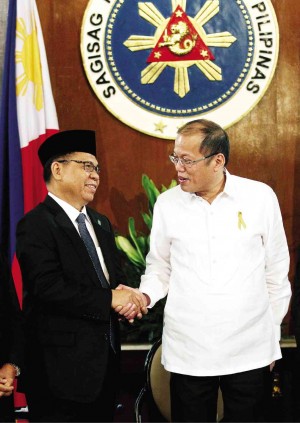Bangsamoro task: 715,228 illiterates

MILF chair Al Haj Murad Ebrahim shakes hands with President Aquino the first time he set foot in Malacañang in March. MALACAÑANG PHOTO
BAGUIO CITY—The process of building a Bangsamoro region has started in Congress, but literacy advocates on Friday said one of the government’s crucial problems in the transition from the Autonomous Region in Muslim Mindanao (ARMM) to a new region is an illiterate work force.
Investments are expected to flood Mindanao when peace is achieved, but entrepreneurs may end up getting workers from other provinces or regions because many adults in the ARMM still cannot read, write or count, said Amina Rasul Bernardo, managing trustee of Magbassa Kita Foundation Inc., during this year’s national literacy conference at Teachers’ Camp.
Citing a recent study by the foundation, Bernardo said 38 percent of ARMM’s voting population (or 715,288 of 1.88 million voters in 2010) are illiterate.
“If you are a businessman building a hotel, who will you hire? Will it be the illiterate natives or the literate workers from outside ARMM? Once Tagalogs, Ilonggos, Ilocanos and Cebuanos land jobs and benefit from a peace agreement that should be enjoyed by the local communities, would that improve our conflict situation or will it create another issue of conflict?” said Bernardo, who represented her mother, former Sen. Santanina Rasul, in the conference.
Bernardo said literacy champions have included education in priorities being drawn up for a Bangsamoro master plan. She said the Bangsamoro development plan has targeted 600,000 adults in ARMM for literacy training.
Bernardo said Mindanao educators are hopeful they would be able to teach functional literacy to these adults before the transition process begins.
“The business sector tells us peace is key to economic growth. But key to peace is business investments and development, which is why ARMM’s productivity is low and its poverty [incidence] is high. There is no peace, few investments, few businesses. It is a vicious cycle,” she said.
“But it is a chicken and egg situation,” Bernardo said.
“How can you have inclusive growth in the most conflict-plagued area of the Philippines if one third of your adult [population is] illiterate and cannot avail of the dividends of peace [such as] opportunities for employment [and] opportunities for increased income that will become available when the passage of the Bangsamoro Basic Law brings a surge of investors in the region?” she said.
Bernardo said government educators and nongovernment organizations could improve the literacy rate in ARMM provinces in three years.
Bernardo’s mother, former Senator Rasul, a teacher, had pioneered phono-syllabic teaching in the Philippines in the 1960s. This is an adult literacy teaching method which helps students recognize the alphabet by introducing the sound each letter makes when these are formed into words.
Bernardo said 63,751 adults in ARMM have graduated from literacy classes given by Magbassa Kita (which is Tausug for “Let us read”).
The foundation had also used the phono-syllabic process to introduce concepts like peace and autonomy to communities, she said.
Adults willing to sit for months in village assemblies to learn how to read, write and count, responded well when teachers used concepts like “peace” or “kapayapaan” in lessons.
“We introduced concepts like ‘human rights,’ and even ‘autonomy,’ although that was a hard concept to absorb,” Bernardo said.
She said many Filipinos assume that separatists characterize the peace and order crisis in Mindanao, when it is criminality and clan wars that define violence there.
Many of the graduates were women, Bernardo said, which comprise the highest volume of illiterates in Mindanao.
Many of these women are mothers who may impart lessons about peace and human rights to their children, she said.
The foundation’s graduates have also formed bonds, enabling the government to organize them into economic cooperatives or organizations, she said.
Bernardo said a survey of their former pupils has established that many pursued reading or counting lessons so they could vote properly, handle their financial transactions and avoid being duped, and to be able to send text messages instead of make expensive calls using their mobile telephones.
She said some ARMM beneficiaries of the government’s conditional cash transfer program complained of being shortchanged because they could not operate an automated teller machine (ATM).














